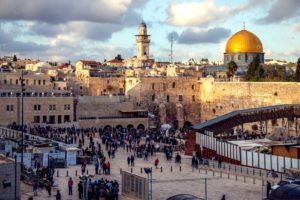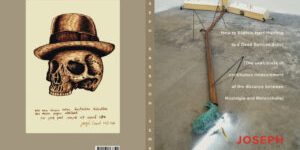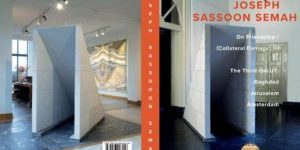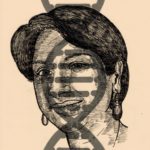East-West GaLUT
No comments yetTreatise on the Origin of Language
The more people invented, the more nomadic and separated they were when they invented, and yet for the most part invented only in a single circle for a single kind of things, then, when they afterwards came together, when their languages flowed into an ocean of vocabulary, the more synonyms! They could not be thrown away, all of them. For which should be thrown away? They were current with this tribe, with this family, with this poet. And so it became, as that Arab dictionary writer said when he had counted up 400 words for misery, the four hundredth misery [is] to have to count up the words for misery.
Treatise on the Origin of Language. Transl. by Michael N. Forester (Cambridge: Cambridge University Press), 117.
Goethe’s Study of Hebrew
From my Life: Poetry and Truth
I found an alphabet something like Greek, of which the forms were easy, and the names, for the most part, not new to me. All this I had quickly understood and learned, and supposed we should now begin to read. This, I was well aware, was done from right to left. But now, all at once appeared a new army of little characters and signs, of points and strokes of all sorts, which were in fact to represent vowels. At this I wondered the more, as there were manifestly vowels in the larger alphabet, and the others only appeared to be hidden under strange appellations. I was also taught, that the Jewish nation, so long as it flourished, had, in point of fact, been content with the first signs, and had known no other way of writing and reading. I should have liked very much to have gone on along this ancient, and, as it seemed to me, easier path; but my worthy instructor declared rather sternly, that we must be guided by the grammar in its generally accepted form. Reading without these points and strokes, he said, was a very difficult matter, and could only be undertaken by the learned, and the most highly trained scholars. […] At one time, it seemed, some of the primary and larger letters were to have no significance where they stood, simply that their little after-born kindred might not stand useless. At another time they were to indicate a gentle breathing, then a guttural, more or less harsh, or again they were merely pegs on which to hang the others. But, finally, when one fancied that one had taken in everything properly, some of these personages, both large and small, were made sleeping partners, and became inactive, so that one’s eyes always had very much, and one’s lips very little, to do.
Poetry and Truth. From my Own Life. Transl. by Minna Steele Smith, vol. 1 (London: George Bell & Sons 1908), 108-9.
The West-East Divan
“Hegira”
North and South and West are quaking,
Thornes are cracking, empires shaking;
You must flee; the East will right you,
Patriarchs’ pure air delight you; There in loving, drinking,
singing Youth from Chiser’s well is springing
Seeing rightly, seeing purely,
There I’ll penetrate most surely
To the origin of nations,
When on earth the generations Heard God’s words as humans use them,
Did not brain-rack and confuse them.
Poems of the West and East. Transl. by John Whaley (Frankfurt/New York: Peter Lang 1998), 4–5.
The West-East Divan
“Sobriquet”
Poet:
That’s why, Hafiz, I’m inclined To remind you of this sequel: If we share another’s mind We shall be the other’s equal. You I mirror to perfection, I who am myself endowed With our sacred book’s reflection, Like as on that holy shroud Our Lord’s image was impressed, Quickening secret in my breast Conquering sceptic, foe, or thief, Radiant vision of belief.
Poems of the West and East. Trans. by John Whaley (Frankfurt/New York: Peter Lang 1998), 52–53.
The West-East Divan
“Book of Proverbs”
Admit! The poets of Orient
Are greater than we of Occident.
But here with them we fully equate
That we our equals know to hate
Poems of the West and East. Transl. by John Whaley (Frankfurt/New York: Peter Lang 1998), 208–209.
“Spices” Zahava Kalfa
We ate the world, man.
With the teeth with the fork and the nails. Everything that dances, goes, moves and breathes.
We ate the mother of the juice and drank the seeds.
And the trees we cut to write poems and publish books.
I once loved him, especially the touch of light on his face at the twilight, you can’t do anything about that. The glow of this light dripped like wax, like an old perfume.
Then we ate everything and lost the taste.
Season the food, so that it would be as tasty as it always was. Like at your mother’s, he said, with the turmeric and the spicy. Forget it, I said, no spices, just like that, naked.
After a few months he left, found another taste. I cannot believe that it happened that way. Actually, I do not believe anymore.
“Mother Tongue” Zahava Kalfa
Umm Mahmud, who is privately called Nadschla
And officially Mrs. Mahamud
And between us, nobody calls her
Nor me.
We speak here one language.
She explains to me how to prepare Egyptian falafel.
with Ful Mukasher
For a second I thought she’d say Kosher.
With spiced herbs and chopped parsley
and cumin,
not too much of it.
At Ku’damm, the belly full with a little daughter
On the way to ultrasound
A leaflet distributor offers us the business lunch
At half price.
Little Mahmud looks at the pigeons and asks,
Why do they eat all the time?
She reminds him that this morning, he ate as well
And Mahmud continues talking and she answers muttering
A Pigeon.
Where I’m from?
Forty years
My parents are from Libya.
I answer
And my sister tells me about
the persecutions of the Jews
Thirty years ago in Syria.
Mother tongue, sometimes it flows and sometimes
it stutters.
Preparations for a Caesarean section
I am translating the forms into Arabic.
How should I translate thyroid gland?
You don’t have any thyroid gland problems,
I scanned her eyes
soaked with sweat.
You May Also Like
Comments
Leave a Reply






